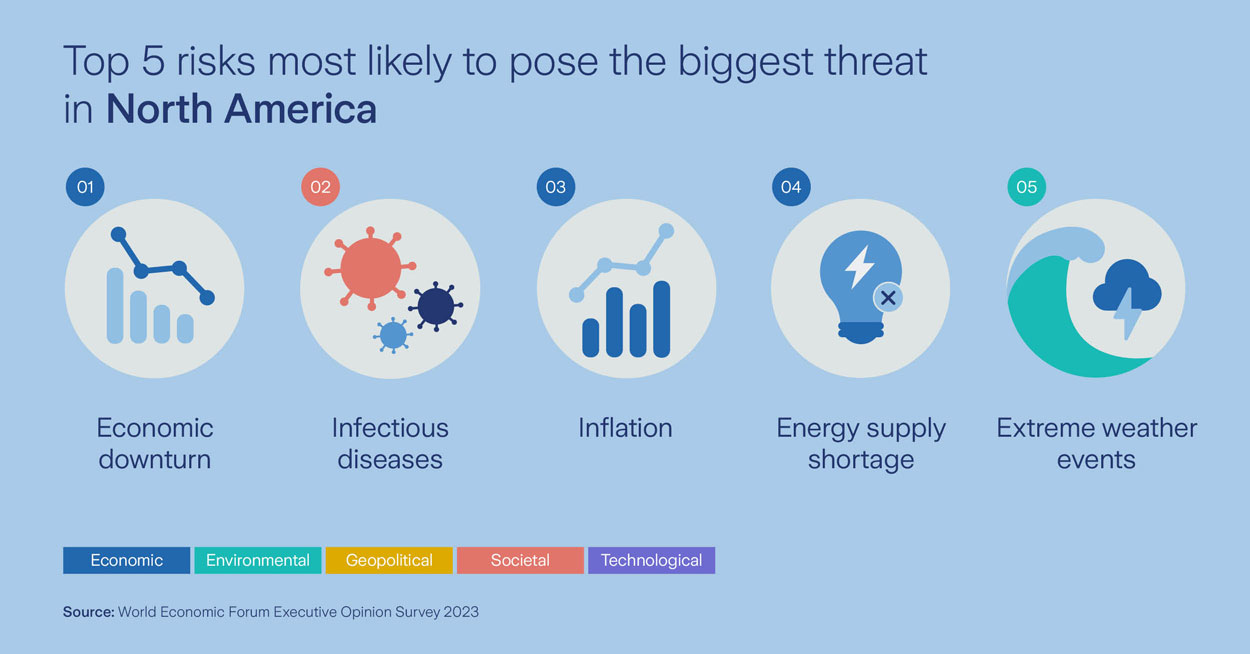
North American businesses buck trends on attitudes toward risk
Diseases, disasters and economic risks dominate the minds of North American business leaders, according to the World Economic Forum’s Executive Opinion Survey 2023.
The survey analyzes insights from 11,000 respondents in over 110 countries and territories, capturing the priorities and concerns of business leaders around the globe.
Economic concerns weigh heavily on the minds of North America’s business leaders, a trend that is mirrored across the survey. But their responses reveal a distinct set of concerns focused on security, health and climate.
Climate and health among the top risks
Economic downturn tops the list of risks for North American business leaders, as it does in most other regions. Inflation and energy supply shortage also rank in the top five risks, in third and fourth place, respectively.
But North American business leaders have specific regional concerns. For instance, they rank infectious diseases as the second most significant risk to business, in stark contrast to their peers; European leaders put this threat in 22nd place.
North American leaders also include extreme weather events in their top risks at number five, and it’s not hard to see why. Some 42 million acres of Canadian land, an area the size of Liechtenstein, has been scorched by wildfires in 2023, making it the country's worst fire season on record. Meanwhile, the U.S. has experienced 24 extreme weather events with losses exceeding $1 billion each, more than any other year on record. The risk posed by extreme weather events also features in the top five risks for Oceania, Latin America and the Caribbean, making it the top environmental risk analyzed in the report.

“While economic uncertainty may be top of mind for most business leaders, as well as households, it is becoming increasingly difficult to ignore the existential threat of climate change and its impact on extreme weather events,” said Zurich North America CEO Kristof Terryn. “We are now living in a world of competing catastrophes – wildfires and floods, windstorms and severe droughts – and managing the transition to a warmer planet will require new ways of assessing and addressing risks.”
Focus on security and climate
Risks to physical and technological security are notable concerns for North American leaders. The adverse outcomes of artificial intelligence and attacks on critical infrastructure are ranked at 10 and 12. AI-related risks also score highly in other regions, including Central and South Asia, the Middle East and North Africa.
North American leaders are closely aligned with their European peers when it comes to climate. Executives there place the failure of climate mitigation at 15, while European peers rank it at 19, both higher than in other regions.
The data also shows where North American leaders are relatively sanguine. They are confident in the capabilities of the state, placing risks related to state fragility and failure of public services close to the bottom of their worry lists at 33.
Fewer concerns around unemployment
Public debt is a key concern for European and Middle Eastern business leaders, who include this risk in their top five, but North American leaders are far less concerned than their Eurasian peers. Public debt only ranks at 20 for North American leaders compared to a higher rank in other regions.
Finally, unemployment comes in at 26 for North American leaders, far below its place as the third greatest risk for Middle Eastern leaders. This broadly aligns with the attitudes expressed by European and G20 leaders, who rank unemployment below the global average but still higher than North American leaders at 18 and 11, respectively.
North American business leaders agree with their peers on economic and energy risks, but they have key concerns of their own. Infectious disease and extreme weather events weigh heavily on their minds, as do the risks associated with AI, attacks on infrastructure and the failure of climate action. With so many different types of risk at play, the importance of effective risk management is growing at pace.



